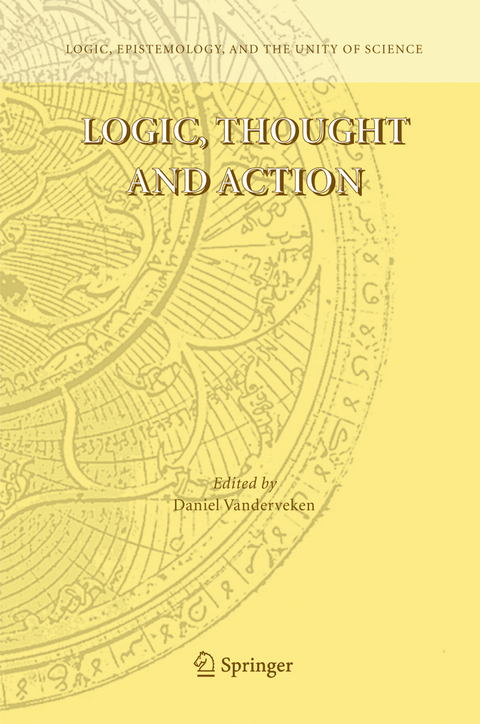
Logic, Thought and Action
Springer (Verlag)
978-90-481-6688-6 (ISBN)
Leibniz, as Dascal stresses, was well aware oftheproblem. Heacknowledged that the b- ance of reason, when it is conceived as a metric and digital balance, lies open to the objection raised above, but he worked out another version of the balance of reason to circumvent this. We can conceive of a balance which permits us to directly compare the "values" of what is placed on the scales without reducing them to universal measuring units.
Reason, Action and Communication.- The Balance of Reason.- Desire, Deliberation and Action.- Two Basic Kinds of Cooperation.- Speech Acts and Illocutionary Logic.- Communication, Linguistic Understanding and Minimal Rationality in the Tradition of Universal Grammar.- Experience, Truth and Reality in Science.- Truth and Reference.- Empirical Versus Theoretical Existence and Truth.- Michel Ghins on the Empirical Versus the Theoretical.- Propositions, Thought and Meaning.- Propositional Identity, Truth According to Predication and Strong Implication.- Reasoning and Aspectual-Temporal Calculus.- Presupposition, Projection and Transparency in Attitude Contexts.- The Limits of a Logical Treatment of Assertion.- Agency, Dialogue and Game-Theory.- Agents and Agency in Branching Space-Times.- Attempt, Success and Action Generation: A Logical Study of Intentional Action.- Pragmatic and Semiotic Prerequisites for Predication.- On How to Be a Dialogician.- Some Games Logic Plays.- Backward Induction Without Tears?.- Reasoning and Cognition in Logic and Artificial Intelligence.- On the Usefulness of Paraconsistent Logic.- Algorithms for Relevant Logic.- Logic, Randomness and Cognition.- From Computing with Numbers to Computing with Words — from Manipulation of Measurements to Manipulation of Perceptions.
| Reihe/Serie | Logic, Epistemology, and the Unity of Science ; 2 |
|---|---|
| Zusatzinfo | XVII, 544 p. |
| Verlagsort | Dordrecht |
| Sprache | englisch |
| Maße | 160 x 240 mm |
| Themenwelt | Geisteswissenschaften ► Philosophie ► Ethik |
| Geisteswissenschaften ► Philosophie ► Logik | |
| Geisteswissenschaften ► Sprach- / Literaturwissenschaft ► Sprachwissenschaft | |
| Mathematik / Informatik ► Informatik ► Theorie / Studium | |
| Mathematik / Informatik ► Mathematik | |
| Sozialwissenschaften ► Kommunikation / Medien ► Kommunikationswissenschaft | |
| Sozialwissenschaften ► Soziologie | |
| ISBN-10 | 90-481-6688-8 / 9048166888 |
| ISBN-13 | 978-90-481-6688-6 / 9789048166886 |
| Zustand | Neuware |
| Informationen gemäß Produktsicherheitsverordnung (GPSR) | |
| Haben Sie eine Frage zum Produkt? |
aus dem Bereich


